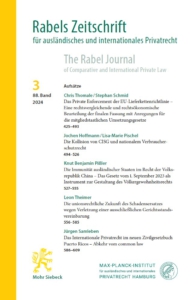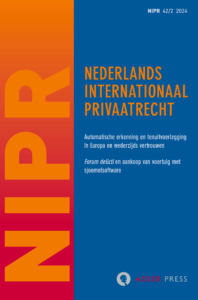By Birgit van Houtert, Assistant Professor of Private International Law at Maastricht University
From 29 July till 16 Augustus 2024, the Summer Courses on Private International Law (PIL) were held at the 93rd session of the summer courses of the Hague Academy of International Law. The PIL courses were followed by 250 onsite attendees and remotely 61 attendees from 74 different countries. The inaugural lecture was presented by Lord Lawrence Collins of Mapesbury (Former Justice at the United Kingdom Supreme Court) on the “Use and Abuse of Comity in International Litigation”. In the next three weeks, the general course was given by Charalambos Pamboukis (Professor at the National and Kapodistrian University of Athens) titled “The Metamorphoses of Private International Law”. During these three weeks, six special courses were given by Alessandra Zanobetti (Professor at the University of Bologna) on “The Effects of Economic Sanctions and Counter-Measures on Private Legal Relationships”; Natalie Y. Morris-Sharma (Director at the Attorney-General’s Chambers of Singapore) on “The Singapore Convention and the International Law of Mediation”; Carlos Esplugues Mota (Professor at the University of Valencia) on “New Dimensions in the Application of Foreign Law by Courts (and Arbitrators) and Non-judicial Authorities”; Jack Coe (Professor at Pepperdine Caruso School of Law) on “Non-ICSID Convention Investor-State Awards in Domestic Courts”; Eva Lein (Professor at the University of Lausanne) on “Breathing Space in International Commercial Litigation”; Andrew Dickinson (Professor at the University of Oxford) on “Natural Justice in Recognition and Enforcement of Foreign Judgements”. These PIL experts provided very interesting and valuable insights, including future (desirable) directions on PIL that can guide and inspire students, researchers, legal practitioners, courts, and legislators. The courses will be published by Brill in the series Collected Courses of The Hague Academy of International Law / Recueil des cours de l’Académie de La Haye. The fact that the courses commonly focused on PIL globally, by including national, regional and international PIL, is particularly laudable in view of our interconnected world. This blog aims to describe common threads of the 2024 Online Summer Courses on PIL that may encourage you to read the Hague Academy Collected Courses and inspire further research.[1]
The interaction between public international law and PIL
All lectures showed that there cannot be drawn a sharp distinction between public international law and PIL.[2] Several lecturers have illustrated the current interaction between these two fields of law. On the basis of case law in England and the U.S. involving private parties, Collins argued that the principle of comity has often been misused in favour of the interests of the forum state. For instance, in a case involving a request for evidence from French airplane manufacturing companies by victims of an airplane crash, instead of a first resort to the Hague Evidence Convention, the U.S. Supreme Court ruled that comity requires an assessment of the interests of the foreign nation involved and the requesting nation.[3] Collins argued that in practice, U.S. and English courts do not give effect to foreign blocking statutes, like the French Blocking Statute, but have ruled in favor of disclosure of documents and information. As the main abuse of comity, Collins pointed out that the Court of Appeals for the Second Circuit in New York has rejected the enforcement of arbitral awards for reasons of forum non conveniens. With respect to the grant of anti-suit injunctions, courts nonetheless ruled that comity requires caution as these injunctions involve an indirect interference with proceedings of foreign courts unless the injunction aims to prevent a breach of a choice of court agreement or arbitration agreement.[4] Another illustration on the interplay between public and private international law can be drawn from the Zanobetti’s lectures who argued that economic sanctions may set aside the lex contractus by means of the public policy exception in PIL. In the context of investor-state arbitration, Coe and Morris-Sharma have referred to the intersection between PIL and public international law. Coe in particular demonstrated the common features between business-to-business arbitration and non-ICSID (International Centre for Settlement of Investment Disputes) arbitration, both types of arbitration result in awards to which the New York Convention applies. Morris-Sharma has argued that although the investor-state dispute settlement regime mainly concerns state-to-state obligations, a foreign (private) investor may bring a claim directly against the state. While Morris-Sharma gave her lectures on the United Nations Convention on International Settlement Agreements Resulting from Mediation, adopted in 2018, (the Singapore Convention on Mediation, SCM), she noted that whereas this treaty concerns a public international law instrument, it has as subject matter the regulation of private relationships and therefore concerns issues of PIL. In view of current global issues, Morris-Sharma emphasised the importance of “continuing conversations” between public and private international law to bring order into global governance. In addition to research, Maastricht University shows that education could also be a tool to foster these type of conversations as students of the European Law School are taught PIL integrated into courses of European and international law.[5]
The global governance role of PIL[6]
Several courses have demonstrated the increasing role that contemporary PIL plays regarding global goals, varying from the protection of human rights, such as to guarantee the right of a fair hearing in the context of the recognition of foreign judgements as indicated by Dickinson and Lein, to trans-human goals like the protection of the environment as pointed out by Pamboukis. Pamboukis also emphasised the importance of the ‘peacemaking’ role of contemporary PIL, in the sense of the pacification of different values, which facilitates pluralism and the acceptance of the ‘otherness’.[7] However, Pamboukis argued that the trend of anti-globalisation may lead to other metamorphoses of PIL. Esplugues Mota pointed out that there already exist a trend of “nationalisation of transnational situations” fostered by PIL. For instance, as a result of the anti-immigration trend in western countries, the connecting factor of the nationality has increasingly been changed into the ‘habitual residence’ to nationalise situations. Nonetheless, in view of the current global problems, such as climate crises, war and economic sanctions, Jean-Marc Thouvenin (Secretary-General of The Hague Academy of International Law, Professor at the University Paris Nanterre) made in his welcome speech of the 2024 Summer Course the bold statement that “private international law is faring better these days than public international law”. The lectures given by Lein showed that PIL can indeed be a valuable global governance tool in this era of “polycrises”[8] as it facilitates international trade by providing “breathing space” mechanisms to international contractual parties. For instance, parties can generally make a choice for a national contract law that enables them to renegotiate or adapt their contract in case unforeseen circumstances impede the performance of contractual obligations.
Justice as objective of PIL
The courses showed that PIL is increasingly providing justice and PIL should also aim to serve justice. Yet, as mentioned by Pamboukis, the notion of justice is broad.[9] According to Pamboukis, justice is fairness, which includes equality. In the context of PIL, he illustrated that equality is, inter alia, visible by the multilateral character of conflict-of-laws rules and rules that protect weaker parties. Based on natural justice, Dickinson also referred to the importance of the principle of equality for the law that includes both substantive and procedural aspects. To safeguard this principle, he pointed out the public policy exception regarding the recognition and enforcement of foreign judgments.
As the meta-metamorphosis of the traditional, Von Savigny-based, conflict-of-laws rule, Pamboukis pointed out the change of its purpose from conflictual justice, i.e. justice based on geographically closest connection, to substantive justice in the sense of a just, fair result by means of a more flexible conflict-of-laws rule and methods. Pamboukis advocated the increasing important role of the method of recognition, in particular with respect to acquired rights and personal status. He also referred to adaptation and a more flexible application of conflit mobile to achieve a just result in concreto. Furthermore, Pamboukis argued to apply in PIL the principle of proportionality as balancing the concrete interests involved should lead to a fair result. The decision of the French Supreme Court on 17 November 2021, which opened up the possibility of recognising a foreign bigamous marriage in a particular case,[10] seems to be in line with the direction of PIL as advocated by Pamboukis.
With respect to the interpretation of justice in PIL, human rights are also increasingly playing an important role. As indicated by Dickinson and Lein, fair trail rights in human right treaties, like the right to be heard, have influenced the interpretation of the public policy exception in the context of the recognition of foreign judgements. Esplugues Mota nonetheless pointed out the “human rights discourse” regarding the recognition of personal situations abroad as a factor militating against the application of foreign law.[11] The recent Anti-SLAPPs (‘Strategic lawsuits against public participation’) Directive (EU) 2024/1069 could also be seen as an expression of the human rights impact on PIL that influences the concept of justice in the PIL.[12]
Several lecturers highlighted the importance of justice at procedural level. Zanobetti called for further research on the issue whether the ‘no-claim’ clause related to economic sanctions is contrary to the right to have access to courts. Lein argued that PIL provides various tools that facilitate access to justice in times of crises, such as the change of a choice of court clause that can easily be done according to various PIL instruments[13]. Dickinson advocated to pursue natural justice by recognising and enforcing foreign judgements unless they are unjust or inconsistent with the core values of the requested state. Furthermore, the procedure that resulted into the foreign judgement should have complied with procedural principles of natural justice such as due process, and the competence of the court of origin should be in accordance with these principles such as jurisdiction based on the parties’ consent. Dickinson illustrated that several national legal systems and treaties reflect natural right-based principles with respect to the recognition of foreign judgements.[14] On the basis of natural law, Dickinson also advocated that states and courts should pursue multi-dimensional justice when developing rules of recognition and enforcement, which requires an assessment on different levels of relational perspectives, including the parties to the dispute, states, and other human beings. Morris-Sharma argued that access to justice is also facilitated by alternative dispute resolution mechanism. However, Esplugues Mota pointed out that the risk of “second class justice” is high in case arbitrators apply foreign law wrongly, as this application is generally even not subject to control.
The changed state-based approach in PIL
While in international civil disputes, PIL traditionally indicates in which state, or states, the court is competent and the law of which country, or countries, applies, most of the lecturers addressed the growing role of arbitrators with respect to the application of foreign law, including non-state law. Nonetheless, Dickinson’s lectures on the principle of peaceful dispute resolution derived from natural law pointed out the importance of access to an independent and impartial judge who provides binding solutions and the possibility of appeal. As mentioned earlier, Esplugues Mota emphasised the risk of “second class justice” in case of alternative dispute resolution. Several lecturers referred to the use of AI technologies in dispute resolution, including AI courts. However, as indicated by Lein, judgements based on the use of AI technologies run the risk of not being recognised on the basis of the public policy exception. This risk seems high considering the fact that AI technologies are not (yet) accurate and fully impartial as they are based on human biases, like gender bias.
Several courses showed that the application of non-state law is playing an increasing role with respect to cross-border disputes between private parties.[15] As explained by Esplugues Mota, the application of non-state law may entail difficulties as regards its meaning, content, characterisation, and level of certainty. Esplugues Mota nonetheless asserted that certain non-state rules, namely the law of the societas mercatorium,[16] religious law,[17] and indigenous law,[18] are increasingly taken into account, or even applied by non-state and state authorities. In this way, PIL facilitates legal pluralism.
Concluding remarks
As argued by Pamboukis, PIL generally became more open, flexible. The courses indicated the need for PIL to remain open to the influence of human rights, pluralism, non-state law, including the law of nature, and the ‘otherness’. Fingers crossed that this openness of PIL continuous to grow in spite of the upcoming movement of anti-globalization, nationalism, including right-wing extremism. Therefore, international cooperation in PIL remains highly important.
[1] As I followed the courses online, this blog does not concern the seminars or elective courses that were given onsite at the Hague Academy of International Law. The assignment for writing this blog was given by Maastricht University, which made it possible for me to attend these courses.
[2] The scholar Alex Mills has frequently published on the blurry distinction between public international law and private international law.
[3] See Societe Nationale Industrielle Aerospatiale v. U.S. District Court 482 US 522 (1987).
[4] Collins referred to the Laker Airways litigation, inter alia, Laker Airways Ltd v Sabena Belgian World Airways, 731 F. 2d 909 (DC Cir 1984).
[5] On the combination of teaching of public and private international law, see also Poomintr Sooksripaisarnkit and Dharmita Prasad, “Private International Law and Public International Law-Increasing Convergence or Divergence as Usual?”, in: Poomintr Sooksripaisarnkit and Dharmita Prasad (eds.), Blurry boundaries of public and private international law: towards convergence or divergent still?, Singapore: Springer 2022.
[6] Robert Wai and Horatia Muir-Watt are among the scholars who frequently published on the role of global governance role of PIL.
[7] With respect to the concept of pluralism and the ‘otherness’, Pamboukis referred to the scholar Santi Romano. On this interesting topic, see also Horatia Muir Watt who has published her 18th Rabel Lecture in November 2002 on Alterity in the Conflict of Laws-An Onthology of the In-Between.
[8] Lein defined the term ‘polycrises’ as “the simultaneous occurrence of several catastrophic events” such as pandemics, environmental disasters, and armed conflicts. Lein referred in this context to Catherine Kessedjian, “Chapter 12, International Law and Crisis Narratives after the Covid-19 Pandamic”, in: Mbengue, d’Aspremont, Crises Narratives in international Law 2022, pp. 132 ff.
[9] With respect to various views on the concept of justice in PIL, see also Michael S. Green, Ralf Michaels, Roxana Banu (eds), Philosophical Foundations of Private International Law, Oxford University Press 2024.
[10] See the EAPIL blog post, on 6 January 2022, “French Supreme Court Opens Door for Recognition of Foreign Bigamous Marriage” by Marion Ho-Dac.
[11] Esplugues Mota referred in this context to the Wagner and J.M.W.L. v. Luxembourg case of 2007 involving the right to have a family on the basis of Article 8 European Convention on Human Rights.
[12] With respect to improvements and challenges of the Anti-SLAPPs Directive (EU) 2024/1069 in the context of PIL, see my forthcoming article in Nederlands Internationaal Privaatrecht no. 4, 2024.
[13] In this context, Lein referred to, inter alia, Article 25(2) Brussels I Regulation (EU) 1215/2012.
[14] Dickinson referred to, inter alia, the criterion of “fundamental principles of procedural fairness” in Article 7(1)(c) of the 2019 Hague Judgements Convention.
[15] Ralf Michaels has frequently published on non-state law in the context of PIL. See, inter alia, Ralf Michaels, “The Re-State-Ment of Non-State Law: The State, Choice of Law, and the Challenge From Global Legal Pluralism”, 51 Wayne Law Review 1209-1259, 2005.
[16] In this context Esplugues Mota referred, inter alia, to Article 13. III of the Private International Law Act of Uruguay of 2020; Article 3 Hague Principles on Choice of Law in International Commercial Contracts of 2015.
[17] Esplugues Mota referred to, inter alia, the decision of the French Cour de cassation on 6 May 1985 that awarded damages to a divorced Jewish woman as she could not remarry within the Jewish faith because her husband did not ‘give the Get’.
[18] In this context Esplugues Mota referred, inter alia, to Article 1(1) of the South African Law of Evidence Amendment Act 45 of 1988 on judicial notice of law of foreign state and of indigenous law.
 Issue 3 of RabelsZ 2024 has just been released. It contains the following articles:
Issue 3 of RabelsZ 2024 has just been released. It contains the following articles:
 The decision has long been awaited: eigth months after the Opinion by AG Szpunar (discussed
The decision has long been awaited: eigth months after the Opinion by AG Szpunar (discussed 